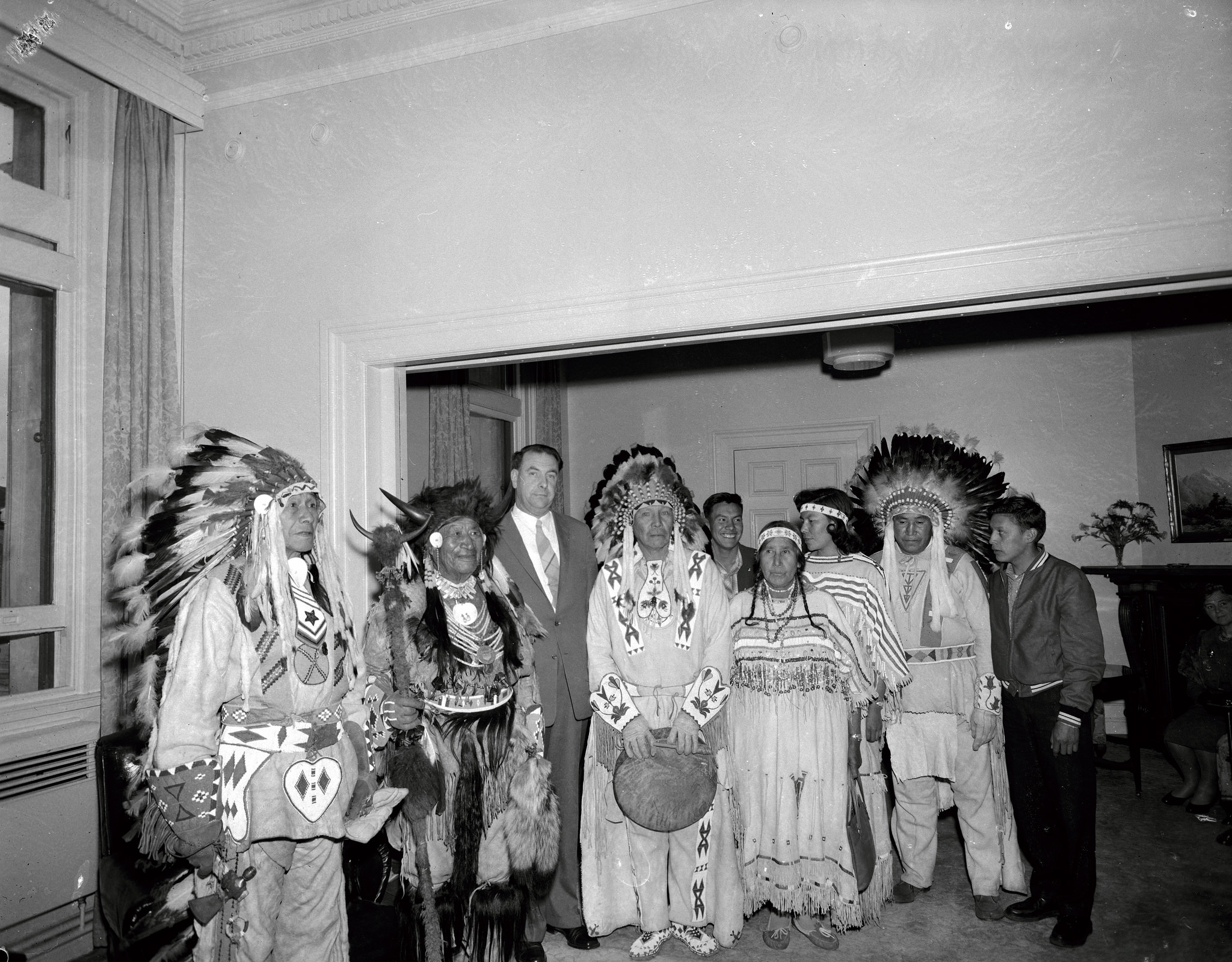Article
Nunavimiut (Ungava Inuit)
The term Ungava, meaning "towards the open water," was used to designate the Inuit band established at the mouth of the Arnaud (Payne) River.

Enter your search term
Signing up enhances your TCE experience with the ability to save items to your personal reading list, and access the interactive map.
Create AccountArticle
The term Ungava, meaning "towards the open water," was used to designate the Inuit band established at the mouth of the Arnaud (Payne) River.
"https://www.thecanadianencyclopedia.ca/images/tce_placeholder.jpg?v=e9dca980c9bdb3aa11e832e7ea94f5d9" // resources/views/front/categories/view.blade.phphttps://www.thecanadianencyclopedia.ca/images/tce_placeholder.jpg?v=e9dca980c9bdb3aa11e832e7ea94f5d9

Article
Walking Buffalo (born Tatanga Mani, also known as George McLean), Stoney-Nakoda leader, statesman, philosopher (born 20 March 1870 in the Bow River Valley near Morley, AB; died 27 December 1967 in Banff, AB). Walking Buffalo was present at the signing of Treaty 7 (1877) and later served as a respected leader in Bearspaw First Nation until his death. Walking Buffalo preached world peace and, in 1959, journeyed around the globe to spread this word. He was a strong advocate for protecting the environment and Indigenous rights and culture.
"https://d3d0lqu00lnqvz.cloudfront.net/media/media/ef31eb4f-564e-42bf-891d-61e5a4da5f87.jpg" // resources/views/front/categories/view.blade.phphttps://d3d0lqu00lnqvz.cloudfront.net/media/media/ef31eb4f-564e-42bf-891d-61e5a4da5f87.jpg

Article
Willie Adams, OC, Liberal senator, businessman, electrician (born 22 June 1934 in Kuujjuaq [then Fort Chimo] in Nunavik, Quebec). As Canada’s first Inuit senator, Adams frequently sought greater federal government support for his people in education, health care, infrastructure, land claims, fishery allocations and affordable food, housing and fuel. He was actively involved in the creation of Nunavut and supported Inuit language rights, art and culture, and traditional hunting methods such as sealing.
"https://d3d0lqu00lnqvz.cloudfront.net/media/new_article_images/WillieAdams/willie_adams.jpg" // resources/views/front/categories/view.blade.phphttps://d3d0lqu00lnqvz.cloudfront.net/media/new_article_images/WillieAdams/willie_adams.jpg

Article
Jacob Wilton (Willie) Littlechild, CC, AOE, athlete, lawyer, Cree chief, politician, advocate for Indigenous rights (born 1 April 1944 in Hobbema, [now Maskwacîs] AB). Littlechild formed and coached Alberta’s first all-Indigenous junior hockey team and created the National Indian Athletic Association. He is a member of seven sports halls of fame. In 1976, Littlechild earned a law degree from the University of Alberta. He went on to become the first member of Parliament with Treaty Indian Status in Canada in 1988. Littlechild served as a commissioner of the Truth and Reconciliation Commission in 2009. Throughout his career, Littlechild has promoted Indigenous rights both nationally and internationally.
"https://d3d0lqu00lnqvz.cloudfront.net/WiltonLittlechild/WiltonLittlechild1.jpg" // resources/views/front/categories/view.blade.phphttps://d3d0lqu00lnqvz.cloudfront.net/WiltonLittlechild/WiltonLittlechild1.jpg

Article
An Algonquin man declared to Jesuit missionary Paul Le Jeune in 1639: “To live among us without a wife is to live without help, without home and to be always wandering.” While the importance of having a home and wife may have been lost on the itinerant and celibate Jesuit priest, for many First Nations this quote evokes the social, economic and political advantages of marriages, especially in the context of the fur trade. Indigenous women’s labour produced and mended clothing, preserved meats, harvested maple sugar and root vegetables like turnips, trapped small game, netted fish and cultivated wild rice — all crucial survival and subsistence activities in the boreal forests, prairie parklands and northern plains of fur trade society. Through intraclan marriages (see Clan), First Nations women forged extended kin lineages, established social obligations and reciprocal ties, and negotiated for the access and use of common resources across a vast and interconnected Indigenous world. Marriages between different Indigenous villages, clans and nations shaped regional politics, fostered lateral marital alliances and created a geographically diverse and widespread kinship network throughout the Great Lakes- St. Lawrence River Basin, the Hudson Bay watershed, and the Pacific Slope (see Pacific Ocean and Canada.)
"https://d3d0lqu00lnqvz.cloudfront.net/WomenFurTrade/TrappersWifeCropped.jpg" // resources/views/front/categories/view.blade.phphttps://d3d0lqu00lnqvz.cloudfront.net/WomenFurTrade/TrappersWifeCropped.jpg

Article
The Indian Act has affected Indigenous cultures, systems of governance, societies and ways of life since its enactment in 1876. Gender discrimination in the Act further disadvantaged First Nations women, in particular. Until 1985, women with Indian status who married someone without status lost their status rights. Men, on the other hand, did not lose Indian status in the same way. Even after Bill C-31 reinstated the status rights of many women in 1985, the Act still discriminated against women by privileging male lines of descent. Amendments in 2011 and 2017 sought to fix these issues. In 2019, the federal government brought into force the remaining part of Bill S-3, which is meant to address lingering sex-based inequities in the Indian Act. (See also Indigenous Women’s Issues.)
"https://d3d0lqu00lnqvz.cloudfront.net/WomenandIndianAct/LavellMcIvor.jpg" // resources/views/front/categories/view.blade.phphttps://d3d0lqu00lnqvz.cloudfront.net/WomenandIndianAct/LavellMcIvor.jpg

Article
Yellowknives Dene or T'atsaot'ine are a band of the Athapaskan-speaking Dene associated with the region encompassed by the Coppermine and Yellowknife rivers, the northeast shore of Great Slave Lake, and northeast into the Barren Grounds.
"https://d3d0lqu00lnqvz.cloudfront.net/media/media/1a18a5cd-7270-4876-ad51-e325a73fe883.jpg" // resources/views/front/categories/view.blade.phphttps://d3d0lqu00lnqvz.cloudfront.net/media/media/1a18a5cd-7270-4876-ad51-e325a73fe883.jpg

Article
Yvon Dumont, CM, OM, Métis leader, lieutenant-governor of Manitoba (born 21 January 1951 at St. Laurent, Manitoba, a mostly Métis community northwest of Winnipeg). Dumont became involved in Indigenous politics as a teenager and, throughout his career, held senior positions in the Manitoba Métis Federation (MMF), the Native Council of Canada (now the Congress of Aboriginal Peoples) and the Métis National Council (MNC). As MNC president in 1986, Dumont participated in the defeat of the Charlottetown Accord. On 5 March 1993, he was sworn in as the lieutenant-governor of Manitoba, the first Métis person in Canadian history to hold a vice-regal office. Yvon Dumont was a successful appellant in the 2013 Supreme Court of Canada land claims case Manitoba Métis Federation vs. Canada. This case helped bring about the signing of a memorandum of understanding in May 2016 between the Canadian government and the MMF to “advance exploratory talks on reconciliation.” Dumont remains a proponent of recognizing the Métis people as a distinct Indigenous population.
"https://d3d0lqu00lnqvz.cloudfront.net/media/media/4de10db1-6b8b-45ef-a60a-55998c7afca0.jpg" // resources/views/front/categories/view.blade.phphttps://d3d0lqu00lnqvz.cloudfront.net/media/media/4de10db1-6b8b-45ef-a60a-55998c7afca0.jpg
